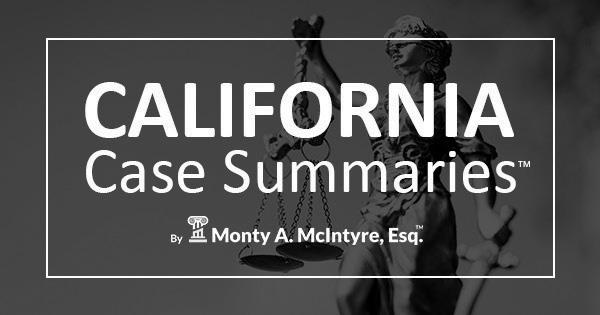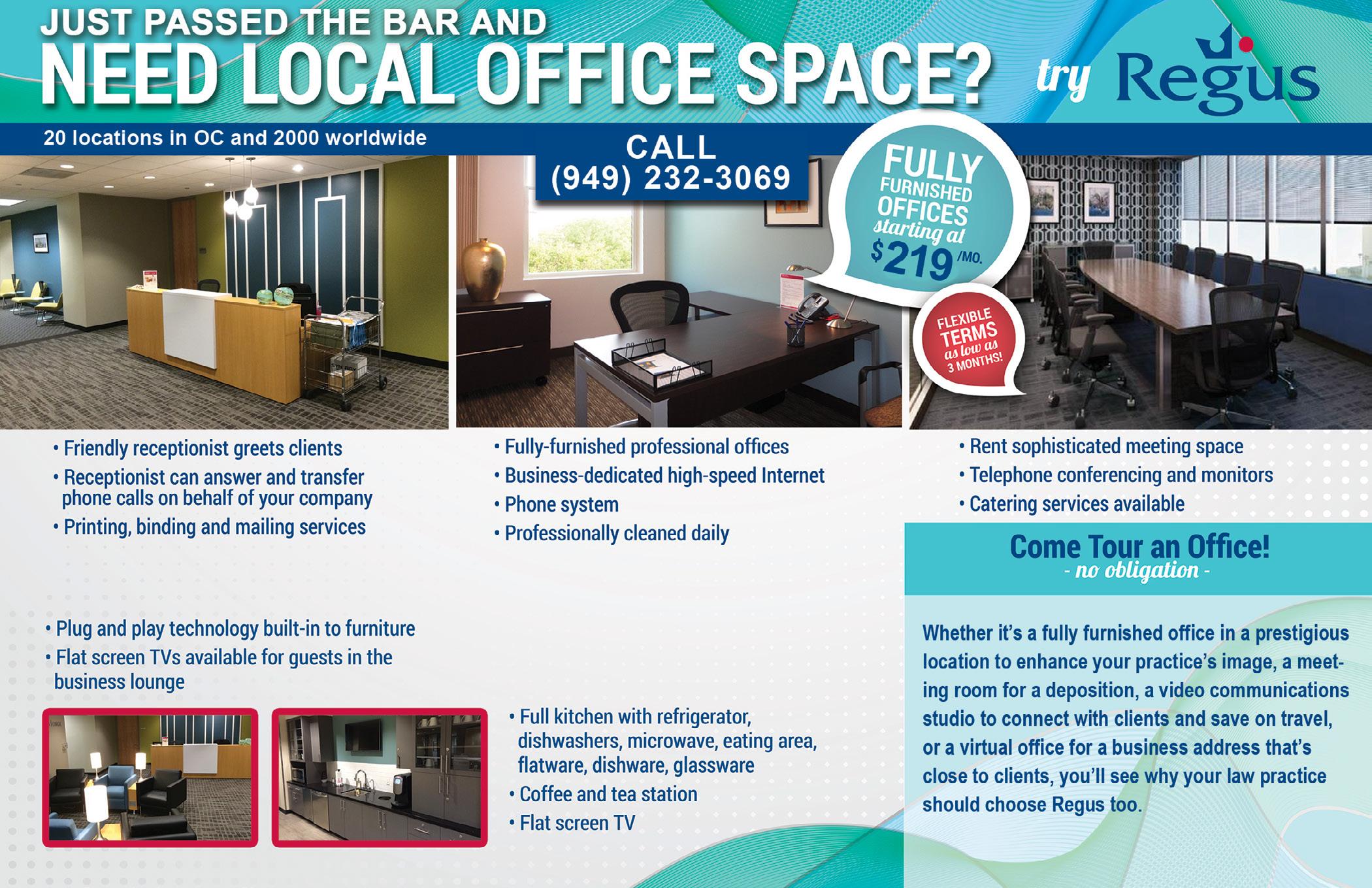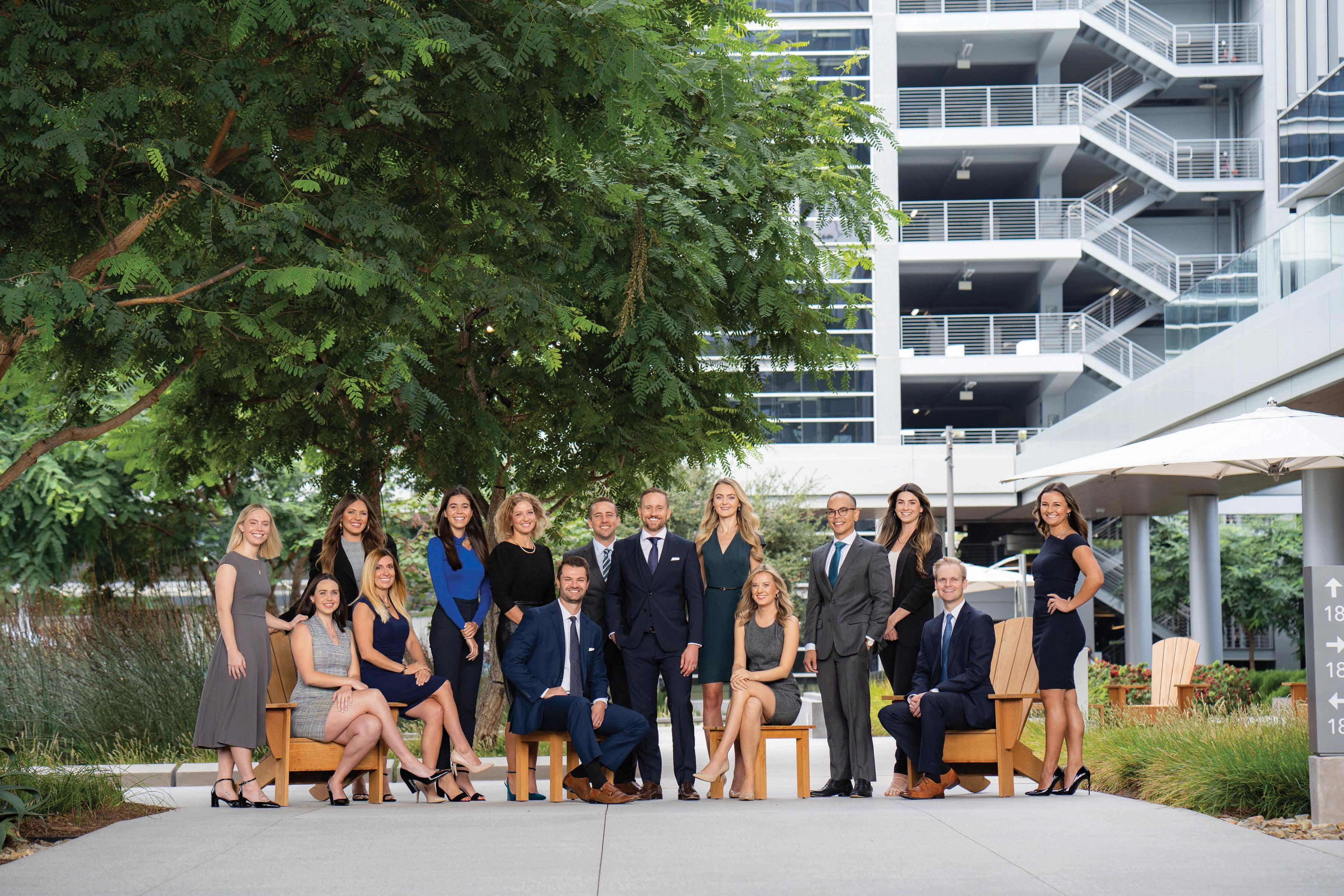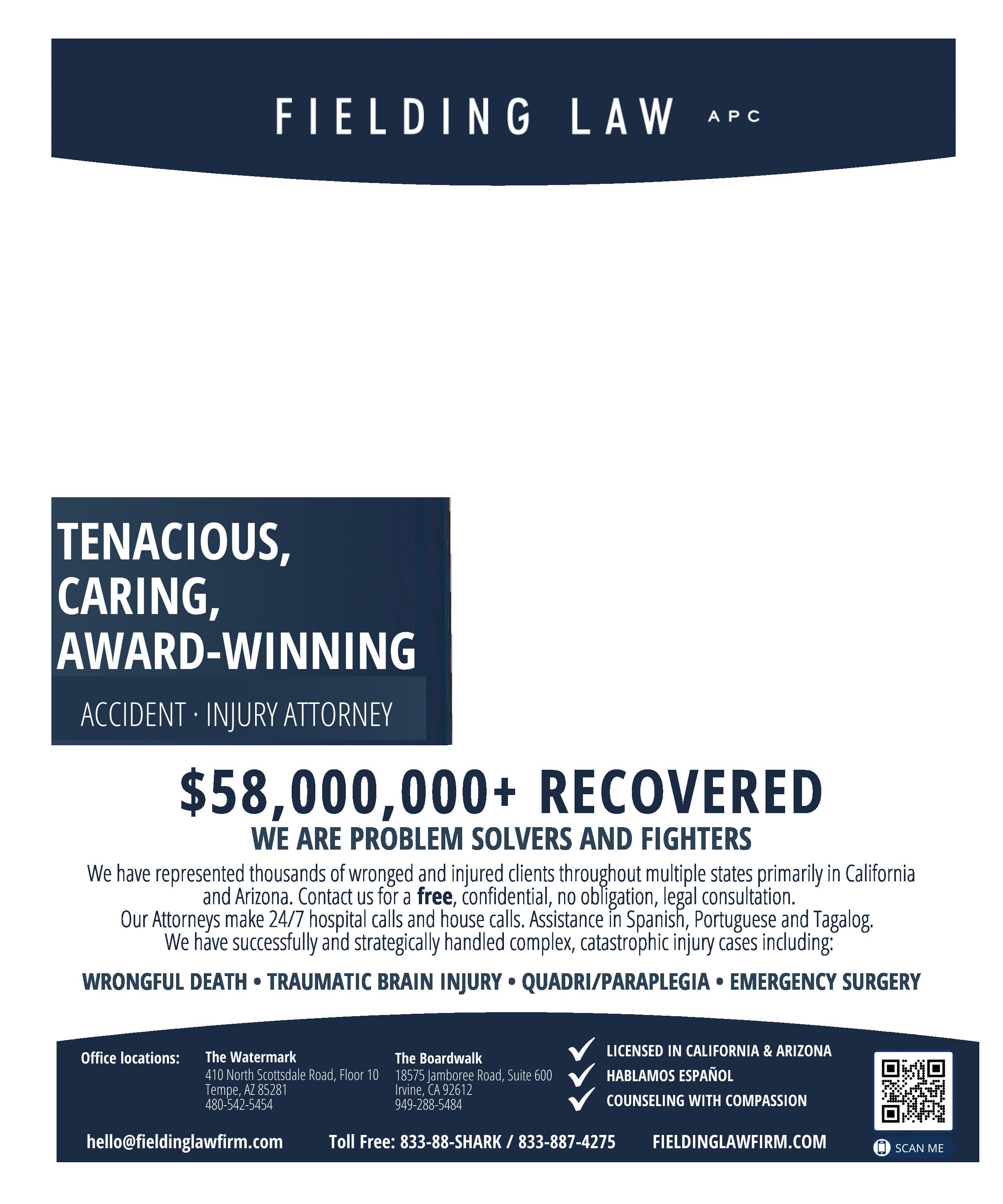


























If you are not calibrating the thought-leadership marketing and business development content you publish and put out into the world, you’re making a mistake.
If you are not calibrating your content, you are just publishing what you think your target audience—current and prospective clients and referral sources—want in the form of your content. But you really have no idea and you’re just putting that content out there blindly.
It’s a one-sided relationship, and we all know how onesided relationships go when one side just does what they want without factoring in what the other side wants.
To avoid having a one-sided relationship with the consumers of your thought-leadership marketing and business development content, you should be calibrating this content to fit what your consumers want from that kind of content.
Here are the five elements of legal thought-leadership marketing and business development content lawyers and law firm marketers should consider calibrating.
First and foremost, lawyers and their firms should be calibrating the substance of their content.
What kind of content does your target audience want from you?
Do they want updates regarding specific developments in the law, like a new and important court decision, proposed legislation, or administrative agency action?
Or do they want trends? Do they want a recap of recent trends over the past quarter or over the past six months regarding the area of law you practice?
Do they want original research from your firm regarding legal developments?
Do they want industry news mixed in with your legal analysis?
Do they want you and your colleagues to analyze what’s happening in their industry?
Of course, when you are talking about the takeaways from a particular legal development or industry news item, are you actually calibrating those takeaways to be what your target audience cares about and/or what is relevant to them?
Or are you just talking in broad strokes because that’s easier for you to do?
The substance of your thought-leadership marketing and business development content might attract your target audience to that content, but its style is what will keep them coming back for more.

How does your target audience want to be communicated to?
Do they want polished, typical law firm writing? Or do they want casual, informal writing?
Do they want the kind of writing they’d see on non-legal and non-business blogs that has snark and attitude?
Remember, you and your law firm’s content aren’t just competing with other law firms’ content. It’s competing with all of the content your target audience consumes:
• Instagram Reels
• TikToks
• YouTube videos
• Amazon product pages
• News sites
• News podcasts
• Entertainment podcasts
• Audiobooks
• Food blogs
• Gossip blogs
• Sports blogs
Your content is competing with all these other kinds of content, so it needs to be calibrated to match the style your target audience will find most compelling, most interesting, and thus, most likely to want to consume and digest.
How does your target audience want your content to be structured?
Do they like the typical 1000- to 2000-word articles that law firms typically put out?

Or would they prefer a 750-word article? Or a 500word article?
What about a 300-word article, Axios-style, with lots of bullet points?
Do they want to consume content in email form? If so, do they want an entire 2000-word article emailed to them? Or do they prefer links in an email, after introductory paragraphs, that link to full-length articles on your firm’s website?
Additionally, do they like the structure of classic business writing? Do they want three to five or six sentences in a paragraph? Or do they want short paragraphs, say with one to three sentences? Do they want a little bit more of an airy structure in the form of more white space as compared to the typical dense business writing structure?
Elements two and three assume the content we’re talking about calibrating is written content.
But maybe your target audience doesn’t want written content.
Maybe they want videos.
Maybe they want podcast episodes.
Maybe they want webinars.
If that’s the case, you should be calibrating the form of your content to match what your target audience wants.
Remember, the name of the game is producing content that is going to be relevant and compelling to your target audience, but above all else, will be consumed by them. That means putting it in the form they will be most likely to consume based on their preferences.
(This doesn’t, however, require you to reinvent the wheel. You can easily repurpose your content into multiple forms of media. For example, you can turn YouTube videos and webinars into podcast episodes, podcast episodes into blog posts, webinars into YouTube videos, etc.)
How frequently does your target audience want to hear from you?
Weekly? Biweekly? Monthly? Daily?
How frequent is too frequent? How frequent is not frequent enough?
Once you get a sense of the frequency with which your audience wants to hear from you, you may be able to more intelligently calibrate the other elements we discussed. For example, if your audience is giving you the sense they want
frequent but short bursts of content from you or your firm, which will guide your content creation and distribution in a particular direction.
Likewise, if your audience is telling you they want occasional deep dives, that will guide your content creation and distribution in practically the opposite direction.
As you could have guessed, the key to calibrating these five elements of your or your firm’s thought-leadership content is getting feedback from your target audience members.
You need to be talking to them every so often, taking their content-consuming temperature, and getting a sense of their preferences for the substance, style, structure, form, and frequency of the professional content they consume. Once you do this, you can calibrate your content accordingly.
You don’t have to sit them down for an hour to have these discussions. These conversations can be weaved into your regular conversations with them regarding the substantive work you’re doing for them.
At the same time, if you ask five or ten different clients or referral sources, they’re probably going to tell you five or ten different answers. That’s fine. What you’re trying to do is get feedback and find patterns in this feedback so you can create content that is more likely than not to be of the substance, style, structure, form, and frequency that the majority of the audience members you’ve spoken with prefer.
Like I said earlier, it’s rarely a good thing in a relationship when one side says what it wants without factoring in what the other side wants to hear.
This is as true when it comes to your and your firm’s thought-leadership marketing and business development content as it is your personal and professional relationships.
Calibrate your content along the five elements above to maximize its effectiveness and its likelihood of being consumed. Content that’s more likely to be consumed is more likely to do its job, which is position you and your colleagues as authorities regarding the areas of law you practice. n
Wayne Pollock is the founder of the Law Firm Editorial Service. The Law Firm Editorial Service sets free the knowledge and wisdom trapped inside Big Law and boutique law firm partners by collaborating with them to strategize and ethically ghostwrite book-of-businessbuilding marketing and business development content. Learn more at: www.lawfirmeditorialservice.com.
ROI can be difficult to assess with content marketing. For determined business owners, this can feel like a major barrier to investing money in content. It’s true, you should never spend money on ineffective, vague marketing tactics—but content marketing is well worth the investment if you understand the role it plays in generating business.
If you want to grow your business, you expect to see new revenue when you invest in marketing. While a PPC campaign has a straightforward process for calculating ROI, content marketing can feel like a black hole with no direct ROI.
This article offers a behind-the-scenes perspective on content marketing—because we don’t believe in asking business owners to spend money on things they don’t understand!
While you’re unlikely to tie a new lead or case to a single blog post, that’s arguably a short-sighted way to think about marketing. We view content marketing as one touchpoint (a powerful touchpoint!) within the greater attorney selection process. It usually takes several touchpoints before most people retain a firm, and great content can be extremely effective.
Keep reading to learn about four powerful ways in which content marketing can support the growth of your business—and why content marketing is definitely worth your investment.
Measuring performance and quantifying results is possible with many aspects of marketing and website development. Pay per click (PPC) campaigns and website traffic give straightforward metrics that, frankly, feel really nice to review. You can easily assess the input and output of these tactics.
Content is not so easily quantified—because its value is ongoing, contextual, and increasing.
Try to think of content as an engagement tool. The purpose of content is to drive prospects further into your funnel. Content is far more than a simple equation of clicks. It can build relationships, increase your ranking in the search engine results pages, and create momentum for prospects.
A smart content marketing strategy uses new posts, evergreen posts, client newsletters, and social media to establish a harmonious system that generates ongoing value.
Unlike PPC, there is long-term value in organic content. Adding new, relevant content to your website is a critical component of law firm SEO.
While short-term growth strategies like PPC are good, long-term growth is better. Search engines assign higher rankings to sites that publish new, valuable content regularly. If you want your firm to be discoverable in organic search results, you must invest in great content.
Great content is more than just information. Many people underestimate the power of content because they see it as a simple competition to provide the best information.
Tone and core values are two components of great content—and infusing your content with your unique brand can help you stand out from the crowd.
To set yourself apart from your competitors, you need two things: brand awareness and trust. The right content can do both. Recognizability is how you will earn more business than other firms.

A conversation can be a steppingstone to retaining your firm.
content sparks conversations, pulling prospects into the funnel and prompting them to reach out.
When someone reaches out to you after reading a piece of interesting content, the scene is set for you to gain a new client or book a new speaking opportunity. Don’t overlook the power of content to create connection (and business opportunities).
Have you ever struggled to figure out what to write in your nurture newsletters? Do you feel lost when trying to come up with social media posts?
Focused, high-quality content can be the foundation of other touchpoints throughout your business.

A touchpoint is an interaction that someone has with your brand or business. Rather than attempting to generate ideas from scratch—which often results in a scattered approach and inconsistent results—you can use your content strategy to guide you.
A steady stream of new content can be the backbone of a killer social media strategy, a consistent newsletter schedule, and an effective funnel for driving referrals.
Content is extremely powerful, even though it can be difficult to quantify. Here are four keyways that investing in great content can help grow your business:
• Content can help your site rank better
• Content can help establish recognizability
• Content can help to drive conversations
• Content can be the backbone of other touchpoints n
Over the past 15 years, Omnizant helped nearly 2,000 law firms across the country build dynamic websites and powerful marketing campaigns, empowering them to achieve their growth goals. Whether you simply want a professional web presence for referral validation or are looking to supercharge business from the web, we have the expertise to get you results. Learn more at: www.omnizant.com.
Reporting.
nationwide service since 1986.
day one of your deposition to the last day of your trial, Peterson Reporting is an indispensable member of your trial team. Proven professionalism and proficiency for more than 25 years.
owned, globally known.
B Street, Suite 350 San Diego, CA 92101
Monty A. McIntyre, Esq. is the publisher of California Case Summaries™, which provides monthly, quarterly and annual summaries, organized by legal topic, of every new published CA civil case—helping lawyers save time, win more, and make more money. Monty has been a California civil trial lawyer since 1980, a member of ABOTA since 1995, and is a mediator, arbitrator and referee at ADR Services, Inc., conducing Zoom hearings throughout California. To schedule a matter, contact Monty’s case manager Haward Cho, haward@adrservices.com or hawardSDteam@adrservices.com, (213) 683-1600. California Case Summaries™ (https://cacasesummaries.com).

Hoffmann v. Young (2022) _ Cal.5th_ , 2022 WL 3711715:
After the landlowners’ son invited plaintiff to come to the property, plaintiff was injured while riding a motorcycle on a motocross track built on the property. The California Supreme Court reversed the Court of Appeal’s decision holding that an invitation by a landowner’s live-at-home child operated to activate the exception, under Civil Code section 846(d)(3), to the recreational use immunity under Civil Code section 846(a), unless the child had been prohibited from making the invitation. The California Supreme Court ruled that a plaintiff may rely on the recreational use immunity exception, under section 846(d)(3), and impose liability if there is a showing that a landowner, or an agent acting on his or her behalf, extended an express invitation to come onto the property. In this case, the record did not show that the son was authorized to extend an invitation on behalf of his parents. The case was remanded for the Court of Appeal rule on plaintiff’s claims that the trial court erred by denying her motion for a new trial on the negligence and premises liability claims. (August 29, 2022.)
Brawerman v. Loeb & Loeb LLP (2022) _ Cal.App.5th _ , 2022 WL 3053302: The Court of Appeal affirmed the trial court’s order affirming an arbitration award and denying plaintiff’s motion to vacate the award. The obligation to arbitrate arose from a provision in a law firm retainer agreement, but one of the several law firm attorneys that rendered legal services pursuant to the retainer agreement was not a licensed California lawyer. The Court of Appeal affirmed the award finding there was no error. The unlicensed attorney’s illegal practice of law pursuant to the retainer agreement did not render the entire retainer agreement illegal. (Birbrower, Montalbano, Condon & Frank v. Superior Court (1998) 17 Cal.4th 119). Moreover, an arbitration provision is severable from an agreement that is not entirely illegal (unless the arbitration provision itself is illegal). (Moncharsh v. Heily & Blase (1992) 3 Cal.4th 1, 30). The arbitration award found that respondents law firm and unlicensed attorney Christopher Kelly were liable to claimants’ for their failure to protect claimants’ control over a business when it obtained venture capital funding, or to disclose to them such lack of control, but claimants failed
to prove that this conduct caused them harm. The arbitrator also ordered disgorgement to claimants of $138,075 in fees paid for Kelly’s services while he was unlicensed and $94,933 for claimants’ fees incurred in the arbitration in connection with litigating this issue. (C.A. 2nd, August 3, 2022.)
Oswald v. Murray Plumbing & Heating Corp. (2022) _ Cal. App.5th _ , 2022 WL 4008088: The Court of Appeal reversed the trial court’s order denying defendant’s motion to compel arbitration in plaintiff’s lawsuit alleging violations of the Private Attorneys General Act (PAGA; Labor Code, section 2698 et seq.). While the right to file a PAGA action generally cannot be waived by contract, the Labor Code exempts construction workers from PAGA if a collective bargaining agreement (CBA) covers wages, hours and working conditions and (1) has a grievance and arbitration procedure to redress Labor Code violations; (2) clearly waives PAGA; and (3) authorizes the arbitrator to award all remedies available under the Labor Code. (Labor Code, section 2699.6(a).) The employment relationship between plaintiff and defendant was governed by a Master Agreement (Agreement) between plaintiff’s union and defendant’s contractor association, effective from 2017 to 2026. The Agreement was a CBA requiring arbitration of disputes—including ones arising under PAGA—as the sole and exclusive remedy. The Court of Appeal held, as a matter of law, that the CBA clearly waived PAGA and satisfied the requirements of Labor Code section 2699.6(a). The trial court was ordered to enter an order directing the parties to arbitrate their dispute. (C.A. 2nd, September 2, 2022.)
Cell-Crete Corp. v. Federal Ins. Co. (2022) _ Cal.App.5th _ , 2022 WL 4103354: The Court of Appeal reversed the trial court’s order denying defendant’s motion for attorney fees and taxing its request for costs. Defendant carrier was the prevailing party in a lawsuit plaintiff brought seeking to recover against defendant on a payment bond. After dismissal, the trial court denied defendant’s request for attorney fees and taxed its costs on the ground that defendant did not incur any fees or costs because a third party, Granite Construction Company (Granite), paid the fees and costs of defendant’s defense under an indemnity agreement between defendant and Granite. The Court of Appeal disagreed, concluding that defendant, as the prevailing party, was entitled to recover their reasonable attorney fees and costs anyway. (Civil Code, section 9564(c); Code of Civil Procedure, sections 1032(b), 1033.5(c)(1).) A party represented by counsel in an attorneyclient relationship is entitled to an award of fees and costs even if they have been or will be borne by a third party. (C.A. 4th, September 8, 2022.)
Gerlach v. K. Hovnanian’s Four Seasons at Beaumont, LLC (2022) _ Cal.App.5th _ , 2022 WL 3443648: The Court of Appeal affirmed the trial court’s rulings, before and during a jury trial, precluding plaintiff from making a claim manufactured roof defects under Civil Code section 896(g) (3)(A), or for roof defect claims under Civil Code section 896 (a)(4) or (g)(11). The Court of Appeal held that (1) a roof is a manufactured product within the meaning of section 896(g) (3)(A) only if the roof is completely manufactured offsite, and (2) to prove a roof defect claim under section 896(a)(4) or (g) (11), a plaintiff must prove that water intrusion has actually occurred or roofing material has actually fallen from the roof. (C.A. 4th, August 17, 2022.)
24th & Hoffman Investors, LLC v. Northfield Ins. Co. (2022) _ Cal.App.5th _ , 2022 WL 3754741: The Court of Appeal reversed the trial court’s order granting plaintiff’s motion for summary adjudication concluding that defendant had been obligated to defend an underlying lawsuit. Defendant issued a policy insuring an apartment owned by plaintiffs. The policy coverage excluded liability for violations of the insured’s duty to maintain a habitable premises, and the exclusion also encompassed coverage for “any claim or suit” that also alleged habitability claims. The trial court concluded defendant had a duty to defendant because the underlying lawsuit alleged both covered and uncovered claims. The Court of Appeal disagreed, concluding that the trial court erred because the plain terms of the contract excluded all of the claims in the underlying action. (C.A. 1st, August 30, 2022.)
Apple Annie, LLC v. Oregon Mutual Ins. Co. (2022) _ Cal. App.5th _ , 2022 WL 4007516: The Court of Appeal affirmed the trial court’s order granting defendant carrier’s motion for judgment on the pleadings in plaintiff’s action for damages under the policy because its restaurants were closed by the COVID-19 pandemic. The Court of Appeal agreed with the majority of other recent Court of Appeal decisions, concluding that a business that closed pursuant to a government shutdown order had not suffered “direct physical damage to” the business’s property as required under the business income coverage of a standard comprehensive commercial liability policy. The mere loss of use of physical property to generate business income, without any other physical impact on the property, did not give rise to coverage for direct physical loss. (C.A. 1st, September 2, 2022.)
Creditors Adjustment Bureau v. Imani (2022) _ Cal.App.5th _ , 2022 WL 3210462: The Court of Appeal affirmed the trial court’s order denying defendant’s motion to vacate a stipulated judgment entered against him for $251,200.13 after he failed to pay $30,000 as required pursuant to a stipulation for entry of judgment. Defendant argued the trial court erred because the judgment was an unenforceable penalty and therefore void. The Court of Appeal disagreed. Defendant was sued for breach of a lease. On the first day of trial the parties entered into a settlement agreement that included a stipulation for entry of judgment. The settlement agreement provided that defendant could fully satisfy his obligation by paying $30,000 in 24 consecutive monthly payments of $1,250 starting April 1, 2015. In the stipulated judgment defendant agreed that he owed $251,200.13 and if he defaulted in making the monthly payments a stipulated judgment could be entered against defendant in the sum of $251,200.13 together with reasonable attorneys fees in favor of plaintiff and against defendant, less any sums received by plaintiff. The stipulated judgment that defendant agreed to accept was the exact amount of damages suffered by plaintiff. Although defendant characterized the stipulated damages as a penalty and/or liquidated damage provision, it was not. (C.A. 2nd, August 9, 2022.)
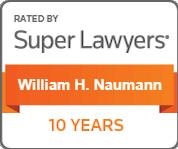
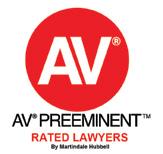
ZF Micro Solutions, Inc. v. TAT Capital Partners, Ltd. (2022) _ Cal.App.5th _ , 2022 WL 4090879: The Court of Appeal reversed the judgment for cross-defendant entered after the trial court ordered a bench trial, not a jury trial, because a cross-complaint alleged equitable issues. Cross-complainant ZF Micro Solutions, Inc. (Solutions), the successor of deceased entity ZF Micro Devices, Inc. (Devices), alleged crossdefendant TAT Capital Partners, Ltd. (TAT) “murdered” its predecessor Devices by inserting a board member who poisoned it. The trial court decided that the claim for breach of TAT’s fiduciary duty as a director was equitable rather than legal, and conducted a bench trial where it found for TAT. The Court of Appeal disagreed, concluding that the “gist” of Solutions’ claim against TAT was a request for compensatory damages for destroying its predecessor corporation. There were no equities to weigh, and no other relief was requested. Under settled law concerning the nature of equitable versus legal claims, this case exhibited all the characteristics of a claim at law. (C.A. 4th, filed August 8, 2022, published September 7, 2022.) n


























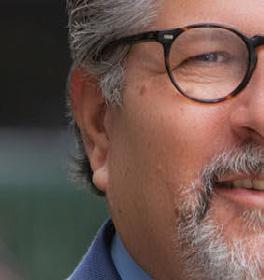
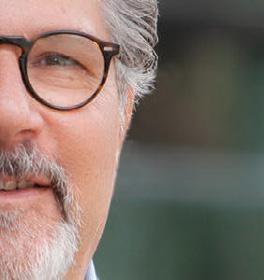
















 Paul D. Woodard
PARTNER
Corey F. Schechter
PARTNER
Paul D. Woodard
PARTNER
Corey F. Schechter
PARTNER

I love working with my team. I enjoy working with people who have the same zest for the practice and interest in helping our clients because there are people out there who don't have two nickels to rub together. Their lives have been catastrophically altered. They don't have insurance. They may not have a doctor. They need direction. They need assistance. And we've got the team that can do it for them,” says Paul Starita, Partner at Gomez Trial Attorneys.
His practice focuses on catastrophic personal injury and mass tort cases. Due much to his military career, he is focused and passionate about assisting veterans and their families who have been injured due to exposure to toxic contamination on military bases. He and his firm are currently involved in assisting those harmed by the toxic contamination of drinking water at Camp Lejeune Marine Corps Base, which has received much coverage in the national media. The team is also currently pursuing a “legislative fix” to assist those similarly harmed by toxic contamination at former George Air Force Base.
After a long career in public service, Starita felt a pull to use his skills, talents, and considerable experience toward helping individual persons who have suffered catastrophic and life-altering
injuries. “We’re on this planet together; maybe we should invest more time and effort into helping each other. Maybe we should work together closely to better all our lives. I’m fortunate to be in a position to do that. And in an important way that really affects people where they live,” he says.
Clients agree. “We are so happy with our decision to utilize the services of Gomez Trial Attorneys. They were so kind throughout our entire legal process. Paul Starita was particularly informative and kept us abreast of any changes and educated us on our options so we could make the best decision for our family.
I would 100% recommend them to anyone! They really treated us like family. Thank you so much. We are so appreciative.” —Tess Harford
Personal injury attorneys work with individual people and families facing some of the most, if not the most challenging moments of their lives and often under tragic circumstances. Starita says keeping focused on the positive outcomes is essential in achieving those positive outcomes. “We can’t be swept up in the horrible and tragic events that really hammer our clients. You can’t waste time worrying because it's your focus that is key to your success. When your focus is on helping someone else, then all that other stuff just falls away.”
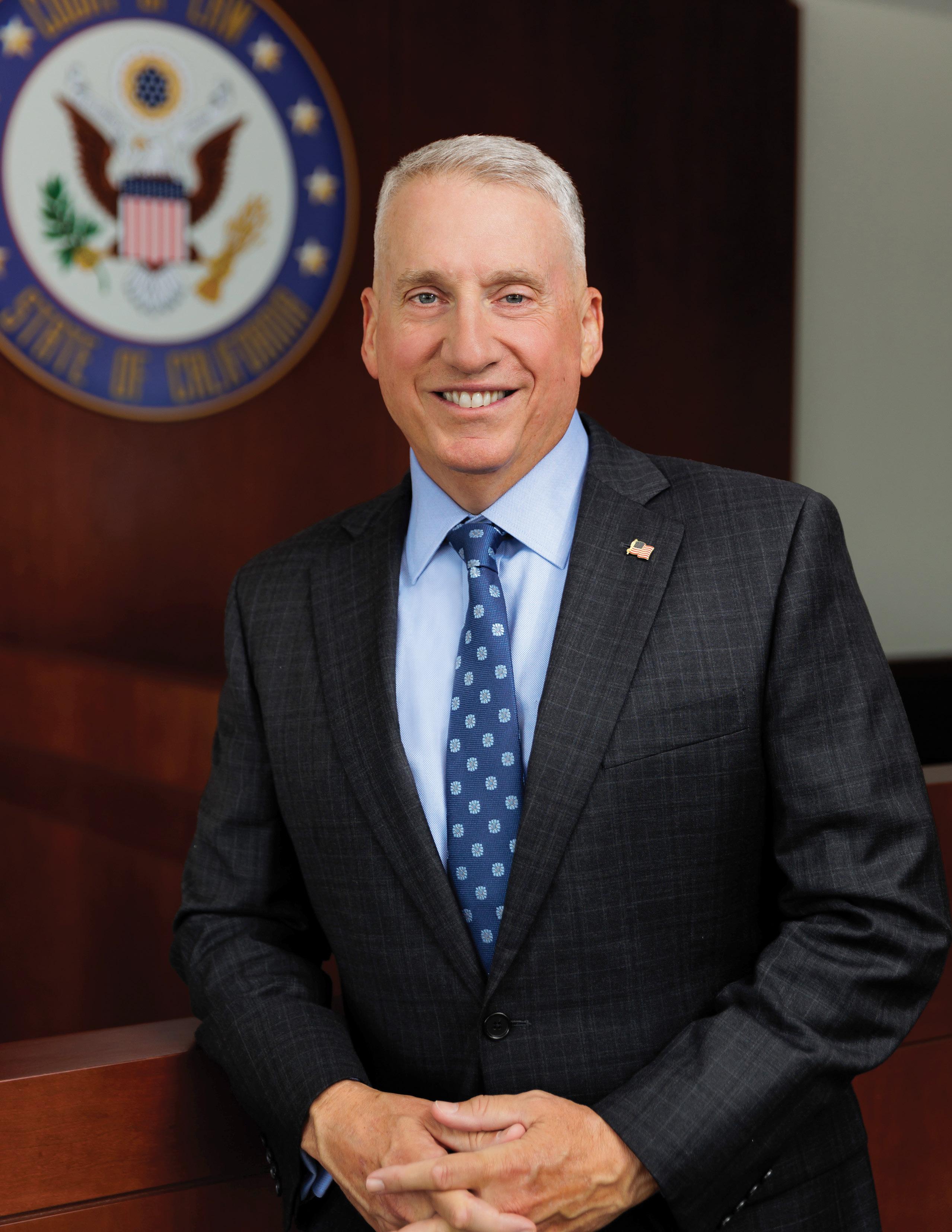
 Paul Starita
ATTORNEY OF THE MONTH 2022
Paul Starita
ATTORNEY OF THE MONTH 2022
Starita credits much of his success to his experience with the United States Marine Corps. He served on active duty and in the Reserve for 30 years, earning the rank of Colonel. He served in various leadership and legal roles, including Military Trial Judge and Appellate Judge on the Navy-Marine Court of Criminal Appeals. He also served as a military prosecutor involving criminal conduct ranging from DUI to murder.
“My service as a United States Marine shaped me as a professional and as a person. Marines are all volunteers; we’re all in this thing together and it's a microcosm of society. And it doesn't matter what the color of your skin is, it doesn't matter what religion you are, your rich-or-poor background, or whether you’re a man, woman, whatever, none of that stuff matters. You're all in it together to achieve a common goal. That’s how you build an organization and win military campaigns. And that’s how you manage a law firm and win cases for your clients.”
In 1993, after graduating from law school, he served as a civilian law clerk on the Central Legal Staff at the United States Court of Appeals for the Armed Forces where he reviewed records of trial from military criminal cases and briefed assignments of error to five civilian judges appointed by the President.
From 1994 to 1998, he served as a Military Prosecutor and Special Assistant United States Attorney at Marine Corps Base Hawaii investigating and prosecuting a wide variety of felonies and misdemeanors. This provided him with the opportunity to “cut his teeth” as a trial lawyer, where he tried more than twenty jury trials.
From 1998 to 1999, he attended the University of San Diego School of Law under the United States Marine Corps’ Special Education Program. This program has a highly competitive selection process and is fully funded by the Marine Corps. He earned a Master of Laws degree (cum laude) with a concentration in environmental law in May 1999.
That year the Marine Corps assigned him to serve as a regional environmental counsel at the Western Area Counsel Office, Camp Pendleton. From 1999 to 2002, he advised senior government officials and staff on environmental and land use compliance and litigation matters for installations in Arizona, California, Hawaii, and Japan. He often negotiated on behalf of the Marine Corps with local, state, and federal regulators
on compliance and enforcement matters arising from myriad environmental laws and regulations. He also served as agency counsel when the United States was subject to suit in Federal district court for actions taken by the Marine Corps and the Department of the Navy. In 2002, he transitioned from active duty to the Reserve and became a litigation associate at Newmeyer and Dillion in Newport Beach, California, where he represented individual landowners, real estate developers, a private water company, and other corporate clients in land use and environmental compliance and litigation matters in California State courts.
From 2004 to 2021, he served as an Assistant U.S. Attorney in the United States Attorney’s Office, Southern District of California, as a federal prosecutor and civil trial attorney. From 2004 to 2014, he served as federal prosecutor in the office’s Criminal Division where he investigated and prosecuted felony offenses involving corruption, drug trafficking and organized crime, human smuggling, money laundering, and violent crime. His practice included the application for domicile search warrants and for warrants authorizing the seizure of electronic communications (under the Stored Communications Act) as well as electronic surveillance governed by Title III (wiretaps).
From 2014 to 2021, he served as a civil trial attorney in USAO’s Civil Division. He defended the United States, its agencies, officers, and employees in a wide variety of litigation matters involving tort claims (industrial accidents, vehicle accidents, and medical malpractice), constitutional torts, and employment. Additionally, he prosecuted affirmative civil enforcement matters (qui tam actions) involving health care and procurement fraud as well as Controlled Substances Act violations.
From 2002 through 2022, he served in the Marine Corps Reserve in a wide variety of legal roles. Notably, during two decades of war, Paul was returned to active duty on two occasions. From 2006 to 2007, he was mobilized to defend Marines accused of war crimes stemming from combat operations in Iraq. In 2009, he was mobilized for approximately four months to serve on the legal staff at United States Africa Command, Stuttgart, Germany. In 2010, he was selected to serve as a Reserve Military Judge, where he served for four years. During his tenure as a Military Judge, he was selected to serve as the Senior Military Judge for the Marine Corps Reserve and was promoted to Colonel. From 2014 to 2022, he served as the Reserve Staff Judge Advocate (I Marine Expeditionary Force), Branch
Head for Reserve Military Prosecutors (Headquarters Marine Corps), and the Reserve Officer in Charge of the Legal Services Support Section—West (Camp Pendleton), and Appellate Judge (Navy-Marine Corps Court of Criminal Appeals, D.C.).
While Military Law is unique, the rules of evidence and procedure are essentially the same as federal and state criminal practice. However, the practice is different in that it's insular. But it is an amazing training ground. Starita says, “You learn how to try a case there, that's a great place because then you learn the same skill set that you're going to need, whether you're doing civil or criminal law in state court or federal court. Those experiences make for an incredible learning opportunity that I apply every day to my work. You must be sharp in those situations. Those years trained me to always ask important questions. Who is our client? What does our client really need? How can we best achieve that? Are we
doing all we can? What have we missed? Where is the hidden opportunity?For me it’s focus—total focus—on serving our client. I very much appreciate John Gomez giving me the opportunity to do just that.”
One of Starita’s most interesting learning experiences stems from a recent run for public office. He ran for a seat on the San Diego County Superior Court in 2020. Although receiving a rating of “exceptionally qualified” from the San Diego County Bar Association, his bid was unsuccessful.
Starita says the race was an exceptional opportunity to meet people from throughout society. The process reminded him of just how much he enjoyed and thrived on the one-on-one contact personal injury attorneys get. In retrospect, losing was perhaps a boon.
 © Bauman
Photographers
© Bauman
Photographers
The matter was put into perspective by his daughter who said something profound. “My daughter said, ‘Dad, you know, I know you love public service. But let me just let you in on a little secret. The public isn't interested in being served. So, if you want to help people, do something where you can have individual client contact, you can get back to the practice of law, where you're helping real people with real problems.’ Her words and the whole run for office was an extraordinary experience that led me to where I am now.”
Starita is a first generation Italian-American and the first in his family to attend college. He is a 23year resident of San Diego who is married with two children. He enjoys physical fitness training and experiencing the outdoors. “I love to hike. I love to run off any kind of stress.” He enjoys country-western music, especially Garth Brooks.
He is also an avid history buff. One of his most memorable learning experiences occurred just after he had been promoted to colonel. He was selected for the National Security Course at the Navy War College, an intensive three-week course on national security. A knowledge of history is essential in national security work. The students had to read nineteen books and write three papers. “It just reminded me just how much I really love the history of the world and the history of our nation, and that there's a lot to be learned from that as an attorney, a citizen and a family man.”
“My experiences serving in the military and then as a civilian attorney help me think more about others than myself. The Marine Corps motto is Semper Fidelis—always faithful. That belief extends though every facet of my life, especially now that I am so active in personal injury. That's not always faithful to me, that's faithful to those that you serve and those you serve with. It’s more than a motto to me; it’s a way of life.” n
Contact Paul Starita Gomez Trial Attorneys 655 W. Broadway, Suite 1700 San Diego, CA 92101 (619) 353-0535 www.thegomezfirm.com


Our first advice to our attorneys and their clients is to take a deep breath, relax and enjoy piece of mind; you’re in experienced and expert hands. “We got this,” says Craig Thomson, co-founder of ADA Compliance Team, Inc. (ACT).
ACT is considered the first one-stop ADA consulting firm in the U.S., a firm dedicated to helping attorneys and their clients with everything from an ADA, CASp, or ICC property site inspection, to architectural plans review, to Scope of Work (SOW) and ADA Remediation Solutions. ACT works closely with a well-researched and proven network of ADA-savvy subcontractors in preparing their ADA remediation estimates, to complete the construction, followed by a final inspection guaranteeing compliance with ADA and California Building Code (CBC) specifications.
Thomson is a California licensed General Contractor who has run a successful construction company for 35 years. Sixteen years ago, he saw a need for business owners to understand the often-complicated ADA compliance requirements, rules and regulations, and the need to understand how to successfully implement them. He and his wife, Ingrid, founded ACT on that basis. They realized that the law relating to construction was dramatically changing and decided, “We should look into this ADA thing.”
While speaking with his long-time friend and business consultant Michael T. “Mike” Prestonise, M.A., he said, “We need to investigate this ADA further. It seems there is a muchneeded business resource for attorneys, their clients and other business owners.” Prestonise became the third member of ACT in place for their 2006 business launch.
Prestonise says, “Attorneys and their clients—shopping center owners, restaurant operators, auto part stores, furniture stores, funeral parlors, check cashing places, and other Title III (public accommodation facilities)—now realize there are going to be more ADA lawsuits coming. Because we are a proven one-stop shop in this area, we want them to consider ACT as their ‘first responder’ when the ADA-related lawsuits arise.”
“The ADA Compliance Team is my first ‘go-to’ call when a client comes to me with a lawsuit claiming an ADA violation. Getting a fast and reliable CASp inspection is absolutely essential in knowing how to deal with the lawsuit, as well as helping my client bring its property into compliance. Inspections are done quickly, and useful and professional reports are generated immediately. Mike, Craig, and the entire team are always efficient, helpful and provide great advice and service. I highly recommend them.” —John B. Marshall, Esq.
The firm’s primary clients are attorneys with clients who get served with ADA lawsuits because of non-compliant elements on their public accommodation property. For example, tow away signs that do not have a telephone number and/or place to retrieve an impounded vehicle. Or an incorrect length and/ or width and/or slope of the accessible parking stalls. Or an improper and/or non-existent path-of-travel. The business owner is responsible for all of these.
ACT works with attorneys prior to ADA litigation or after the ADA lawsuit has been issued to their client. During the past 16 years the firm has worked closely with many Southern California attorney firms as their primary or only ADA consultant. “We prefer—as do they—to operate under the Attorney Client Work Product Privilege ‘umbrella.’Our attorney is the ‘quarterback’ of the operation—we take our instructions directly from the attorney,” Thomson says.
Additionally, once the ADA site survey is complete and the report sent to the attorney, ACT creates a Scope of Work which outlines exactly what ADA remediation needs to be completed. The completed SOW is sent to a handful of ADA-savvy, well vetted, and proven subcontractors for their respective ADA remediation estimates. Once all the estimates are reviewed, ACT recommends which one will be the best fit for the job. The attorney is informed and they in turn authorize the work.


Upon completion, ACT performs a final inspection to guarantee that the property is both ADA and CBC compliant with a detailed report so that the attorney can quickly and less expensively settle the ADA lawsuit. “This scenario is what differentiates us from all others in the ADA consulting realm,” Prestonise says.


To facilitate speed and accuracy ACT has assembled a team of architects, attorneys, designers, contractors, vendors, suppliers, and other influencers experienced in ADA compliance. “Together, we bring an ‘ocean liner’ of wisdom, experience, talent, and creativity to help each client,” says Thomson.
One of the firm’s innovations is their FTP—Formal Transition Plan—for Title III—public accommodation facilities. Municipalities and government entities are required—by law—to create and implement Transition Plans, which is technically under Title II of the ADA. ACT used that government template to create the Formal Transition Plan for Title III facilities. Basically, it is a multi-year approach to ADA remediation. The client agrees to perform some ADA remediation on an annual basis. ACT inspects the property each year and notates the ADA remediation (or lack thereof) in an FTP report. The process continues year after year, depending on the term of the FTP Agreement.
In a fairly typical case, ACT was recently contacted by a property owner who had been sued in two separate ADA


lawsuits on the same property, in the same year. The owner desperately needed help—and fast. The client contacted ACT. After receiving the first CASp Site Inspection Report and reviewing it thoroughly, they contacted the client and told them they could help. ACT proposed two resources: (1) the firm’s architect and (2) a Scope of Work, using the existing CASp Inspection Report as the guide. After the client agreed, the architect did the “phase one” of the project and provided preliminary architectural plans, which the firm took when they visited the site.
ACT team members spent most of the day onsite taking measurements, a topographic survey, drone digital photos, perspective shots, and other studies. Once the SOW was completed and the report sent to the client, the client asked for ADA remediation solutions. ACT’s architect dealt with the city because, in this case, they required permits to perform this work. The architect was not allowed to meet with any city officials. Everything had to be done online due to the pandemic. ACT sent the scope of work to a handful of ADA-savvy subcontractors and eventually chose one to perform the work.
The contractor had to interface with the city officials on numerous occasions, initially via telephone or through online communications, eventually meeting face-to-face onsite. After numerous delays from the city, ACT procured the permit, began the actual ADA remediation from initial
removal of concrete, asphalt, handrails, signage, and so on to completion. This took one week to accomplish. The client had requested a second CASp inspection prior to the work being started, which they ordered and paid for separately. Once all the ADA remediation was completed, ACT representatives met onsite with the second CASp Inspector who re-inspected the entire project.
The CASp Inspector said that ACT really knew the ADA and CBC specifications well and signed off on the project. The City official returned, met the subcontractor on site, walked the property, then issued a signed off permit. “Whew! What an ordeal and it only took 18 months to complete the project,” says Prestonise.
“I have been practicing law nearly 51 years. I represent business owners in ADA-based disability discrimination lawsuits. In many cases time is of the essence because California law reduces, and in some instances completely eliminates, the liability exposure of small business owners who act promptly to remediate the ADA violations called out in a civil complaint. California law provides an incentive to small business owners to eliminate ADA violations quickly, within a limited time frame. I have been working with
ADA Compliance Team and specifically Mike Prestonise and Craig Thomson for several years. What impresses me about the team is their high level of expertise in this complicated area of the law and specifically the ADA Guidelines and California Building Code, and their ability to respond quickly to perform a CASp survey, a report and perform the needed remediations, thus saving my clients lots of money. I highly recommend ADA Compliance Team, Inc.” —Attorney Joseph Arias, Partner, Arias & Lockwood, APLC

ACT sees a strong future because the needs for their services are strong. “As the one-stop shop, we’re ready. As more clients are getting sued for ADA violations, they’re asking ‘what do I do? Who do I call?’ We want to be the first name they think of. ‘Oh, ACT, these guys do everything.’ And they’re right,” Thomson says. n
Contact Mike Prestonise ADA Compliance Team, Inc. (ACT) 2041 Riviera Drive Vista, CA 92084 mikep@adateam.us (760) 801-3833 www.adacomplianceteam.com


We litigate

with
in
and probate court.
focus on
and a

General Counsel today still report that most outside counsel do not know their clients’ businesses at a level the clients expect. Partners will respond by saying they do indeed understand their clients’ businesses. Here are five questions, the answers to which client relationship partners must have. If not, now is a great time of year to sit down with important clients and conduct an upcoming year planning meeting and a current year-end review.
Based on clients’ responses, client relationship partners will be able to better anticipate related legal needs and proactively discuss next steps. Anticipating clients’ needs will be a big step toward differentiating one’s firm from its competitors and allow for greater retention and growth opportunities.
With regard to each client:
Building a strong strategic account plan around the answers to these questions will be an important step for continuing to drive the firm’s retention and revenue goals. n

Silvia Coulter is a Co-founding Principal of LawVision. Silvia is widely regarded as one of the legal industry’s most experienced sales, key client planning, and leadership experts. Her experience includes working as a former strategic account executive and sales leader at a Fortune 50 company, a chief marketing and business development officer at two global law firms, and consultant and facilitator to firms across the globe. Learn more at: www.lawvision.com.

What are the top three strategic growth objectives of the company overall?
Where is the company spending its R&D dollars? Or, for service firms, research investment dollars and efforts?
What is the biggest challenge the company anticipates as it looks toward the upcoming year?
For what services is the client working with other outside counsel and for which of these services will they consider the client relationship partner’s firm?
Who at the C-level of each client should we meet next?
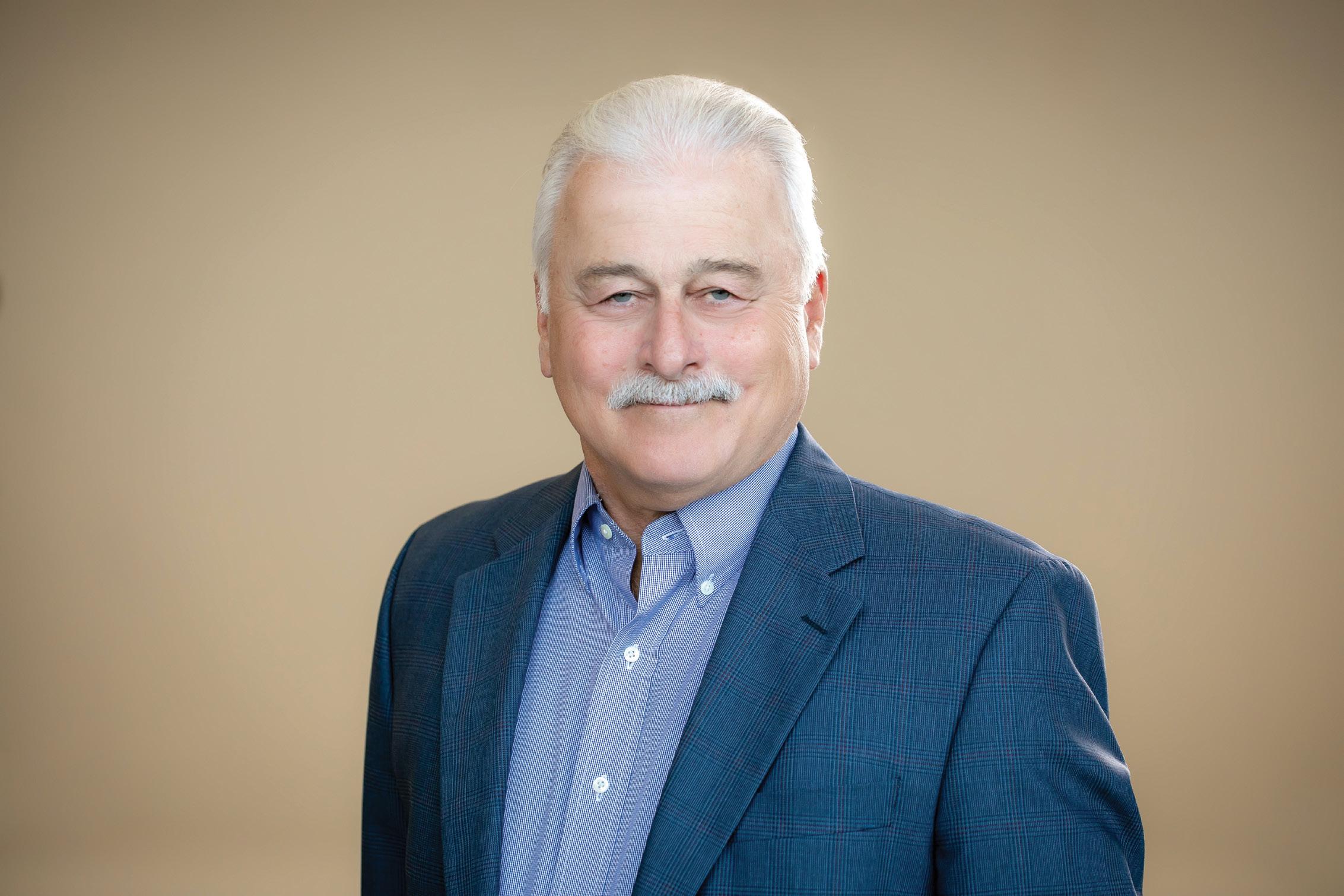
To
(619)
Short summaries (one-paragraph), organized by legal topic, of every new published CA civil case, helping CA attorneys save time, win more, and make more money. Monthly, quarterly, annual, and annual practice area publications are available. Subscribe at www.cacasesummaries.com
